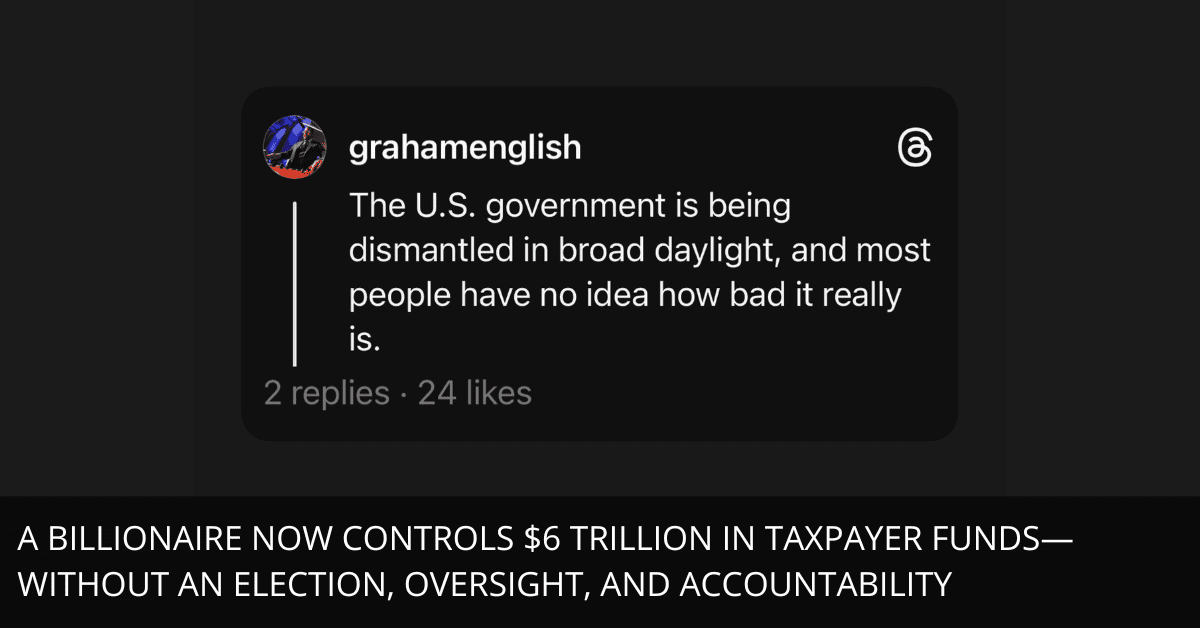
You wake up, check the news, and find out a billionaire has taken control of the U.S. Treasury. Not figuratively—literally.
Elon Musk’s Department of Government Efficiency (DOGE) has gained access to the government’s $6 trillion payment system. His team, a handful of engineers barely out of college, now decides which government programs stay and which get deleted. Let that sink in. A private citizen—with no elected authority—just took control of the country's checkbook.
This isn’t a dystopian novel—this is happening right now.
How Did This Happen?
Musk’s DOGE team infiltrated multiple agencies, starting with the Treasury, USAID, the General Services Administration (GSA), and the Department of Education. They accessed classified data, breached financial systems, and took control of government transactions. Musk called USAID a "criminal organization" and cut off its funding. His team also eliminated IRS Direct File, a program that allowed Americans to file taxes for free.

Elon Musk calls USAID a "criminal organization" and says it’s "time for it to die" in response to a claim that officials were put on leave for blocking DOGE members from accessing agency systems.
Musk openly stated his goal: “If it’s not possible now, it will never be possible. This is our shot.” He is using this moment to dismantle federal agencies and shift power away from elected officials.
Trump’s Trade War and Economic Fallout
While Musk’s team deletes government programs, Trump launched a trade war against Mexico, Canada, and China.
Here’s what he did:
- 25% tariffs on Mexican and Canadian goods
- 10% tariffs on Canadian energy
- 10% tariffs on Chinese imports
The result?
- The stock market dropped 450 points
- Prices for everyday items—think food, electronics, and clothing—are about to spike.
- Canada and Mexico retaliated with $100 billion in tariffs, hitting American agriculture, manufacturing, and consumer goods
- China targeted Google with an antitrust investigation and announced its own countermeasures
Trump later claimed to have negotiated new security agreements with Mexico and Canada, omitting the fact that these agreements already existed. Mexico deployed 15,000 troops at the U.S. border in 2021, and Canada announced a $1.3 billion border security plan in December.

Bluesky users criticize Trump for claiming credit for Canada’s $1.3 billion border plan, announced in December 2024—before his second-term inauguration.
Government Resistance and Legal Challenges
Democratic lawmakers attempted to enter USAID offices but were denied access. Senators Chris Murphy (D-CT), Brian Schatz (D-HI), Chris Van Hollen (D-MD), Jamie Raskin (D-MD), and Gerry Connolly (D-VA) called Musk’s takeover unconstitutional. Raskin said, “We don’t have a fourth branch of government called Elon Musk.”
Three federal employee unions have filed lawsuits. They argue that Musk’s DOGE team has no legal authority to control federal payment systems or access sensitive data. Meanwhile, Judge Loren L. AliKhan ruled against Trump’s attempt to freeze federal funds. The court reaffirmed that only Congress controls federal spending.
America is experiencing a profound change in who holds power in the U.S. government.
- Intelligence agencies are now assuming that U.S. systems are compromised.
- The FBI is being purged of officials who follow the law.
- Political analysts say this looks less like governance and more like dismantling democracy from the inside out.
And the worst part? There’s no official process for reversing this because DOGE isn’t a real government agency. It’s just a billionaire’s pet project, with the White House giving him free rein.
So, what can we do?
Here’s How You Can Take Action
1. Secure Your Financial and Personal Data
Musk’s access to government payment systems puts financial records, tax data, and personal information at risk. Protect yourself by:
- Enabling Two-Factor Authentication (2FA) for banking, Social Security, and IRS accounts.
- Monitoring Your Credit Reports for suspicious activity.
- Freezing Your Credit to prevent unauthorized accounts from being opened.
- Using Encrypted Payment Methods instead of linking bank accounts directly to government portals.
- Backing Up Important Financial Documents offline.
2. Prepare for the Economic Impact
Tariffs will increase prices across industries. Inflation, job losses, and supply chain disruptions are expected. Here’s how to prepare:
- Stock Up on Essentials before prices rise. Focus on groceries, fuel, and household goods.
- Diversify Your Income if you work in agriculture, retail, or manufacturing.
- Find Alternative Suppliers for goods affected by tariffs.
- Support Small Businesses that are adjusting to the new economic landscape.
3. Demand Congressional Oversight
Congress still has the power to investigate and intervene. Here’s what you can do:
- Call Your Representatives and demand hearings on Musk’s unauthorized takeover.
- Support Investigative Journalism that covers the crisis.
- Sign Petitions and Join Advocacy Groups like the ACLU and Government Accountability Project.
- Attend Town Halls and Protests to make your voice heard.
4. Stay Informed and Spread Awareness
Musk and Trump are relying on public distraction to consolidate control. Stay engaged:
- Follow Trusted News Sources that report on government takeovers.
- Educate Your Community by sharing credible articles and updates.
- Engage on Social Media to challenge misinformation.
The Bottom Line: This Is Not Normal
If this sounds unprecedented, that’s because it is.
A billionaire with no elected authority now controls the federal government’s financial infrastructure. A president is bypassing Congress to impose policies that destabilize the economy. The U.S. government is being restructured without public consent.
Congress has the power to act. The courts are beginning to push back. The public still has a voice.
But the clock is ticking.
Take action now. Protect your data, prepare for economic shifts, and demand accountability. Delay makes this crisis harder to reverse.
FAQ: Answering Common Objections to Musk’s Takeover of the U.S. Treasury
1. Isn’t Elon Musk just trying to make the government more efficient?
Musk’s Department of Government Efficiency (DOGE) is not a government agency. It has no legal authority to manage federal programs. Efficiency requires oversight, transparency, and accountability—Musk’s actions involve none of these. His team has unilaterally deleted IRS Direct File, cut funding to agencies, and accessed classified data without Congressional approval. That is not efficiency—it’s corporate dictatorship.
2. If Musk is helping eliminate government waste, isn’t that a good thing?
Eliminating waste requires lawful processes and debate, not a billionaire making unilateral decisions. Many of the programs being cut—like IRS Direct File and student financial aid systems—are widely beneficial. If the government wants to reform spending, it must do so through Congress, not at the whim of an unelected private citizen.
3. Doesn’t Congress have the power to stop this?
Yes, but so far, they haven’t acted decisively. Democratic lawmakers have been physically blocked from government offices, and Republican leadership has remained silent. Courts are beginning to intervene—a federal judge ruled against Trump’s attempt to freeze funds—but without more public pressure, Musk and his team will continue consolidating power.
4. Didn’t Trump negotiate a deal to prevent tariffs from hurting the economy?
Trump claimed new border security agreements with Mexico and Canada, but these were pre-existing policies he repackaged to justify delaying tariffs. Meanwhile, China has already retaliated with antitrust investigations into U.S. companies, and prices on consumer goods will rise regardless. The trade war is far from over.
5. Isn’t this just political fear-mongering?
This is not about partisanship—it’s about who holds power in a democracy. If a single billionaire can take control of government systems without elections, oversight, or public consent, then democracy is being undermined. Both liberals and conservatives should be concerned about unchecked corporate influence in government operations.
6. If Musk is doing something illegal, why hasn’t he been stopped?
Legal processes take time. Three federal employee unions have already sued, and courts are starting to push back. But the longer Musk stays in control, the harder it becomes to reverse his influence. That’s why it’s crucial to demand action now before his changes become the new normal.
7. How does this affect the average American?
If Musk controls government payment systems, he controls Social Security, Medicare, federal salaries, and more. If tariffs continue, you pay more for groceries, fuel, and essential goods. This is not just a political issue—it’s an economic and personal one.
8. What can I do about it?
- Protect your financial data: Enable 2FA, monitor your credit, and secure financial documents.
- Prepare for economic shifts: Stock up on essentials and plan for price hikes.
- Demand Congressional action: Call your representatives, share this information, and support legal challenges against this overreach.
Musk’s power grab is happening quickly. The more people understand what’s going on, the harder it becomes for him to hold onto control. The time to act is now.

